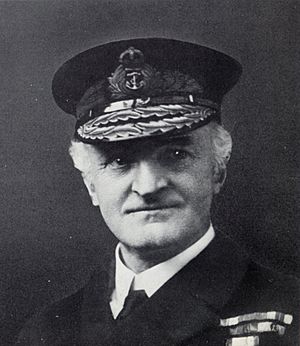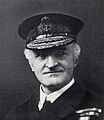Reginald Hall facts for kids
Quick facts for kids
Sir Reginald Hall
|
|
|---|---|

Admiral Hall in 1919
|
|
| Nickname(s) | Blinker |
| Born | 28 June 1870 Britford, Wiltshire |
| Died | 22 October 1943 (aged 73) |
| Allegiance | |
| Service/ |
|
| Years of service | 1884–1919 |
| Battles/wars | World War I |
| Awards | Knight Commander of the Order of St Michael and St George Companion of the Order of the Bath Order of the Rising Sun, Gold and Silver Star |
Admiral Sir William Reginald Hall (28 June 1870 – 22 October 1943), often called Blinker Hall, was a very important figure in British intelligence during World War I. He was the head of the Naval Intelligence Division (DNI) from 1914 to 1919.
Hall played a key role in setting up Room 40, a secret team that broke enemy codes. This team famously decoded the Zimmermann telegram. This message was a big reason why the United States joined World War I.
Contents
Reginald Hall was born in Salisbury, England. His father, Captain William Henry Hall, was also a naval officer and the first head of Naval Intelligence.
Reginald decided to join the navy after a trip on his father's ship, HMS Flamingo. In 1884, he joined the training ship HMS Britannia.
Two years later, he joined the armoured cruiser Northampton. He then moved to the battleship Bellerophon in North America.
In 1889, he became a sub-lieutenant. He studied hard and earned top grades in all his exams to become a Lieutenant. He then served on the flagship Imperieuse in China.
In 1892, he trained to become a gunnery officer. This involved studying mathematics and spending a year at the gunnery school, HMS Excellent.
Early Career and Family
In 1894, Hall married Ethel Wootton de Wiveslie Abney. They had been engaged for five years.
In 1895, he became a gunnery lieutenant on the cruiser Australia. He was promoted to Commander in 1901 for his work in South Africa. Later, he served on the battleship Magnificent.
In 1904, he took command of the battleship Cornwallis. Hall was known for being strict but also for caring about his crew. He could get the best out of even difficult sailors. He made sure his men, especially the younger ones, were well looked after.
Gathering Secret Information
In December 1905, Hall was promoted to captain. He was put in charge of new training centers for engineers.
Next, he commanded the cadet training ship HMS Cornwall. This job got him involved in intelligence work. His ship visited foreign ports, especially in Germany, which was seen as a possible enemy. Hall had a long list of things to investigate.
In Kiel, Germany, he needed to find out how many docks could build large ships. He used a clever trick with the Duke of Westminster's motor boat. Hall and two officers pretended their boat broke down near the naval dockyard. They secretly took photos of the area. They also gathered information by asking careful questions ashore.
In 1910, two officers who had worked with Hall on intelligence, Lieutenant Brandon and Captain Trench, were caught gathering information in Germany. They were jailed for two and a half years. When Hall became head of intelligence, he made sure they were paid back for their losses.
Leading HMS Natal and Queen Mary
Hall later commanded the armoured cruiser Natal. He continued to improve the ship's performance, especially in gunnery. He was known for helping sailors who had problems, rather than just punishing them. He often used clever ways to get them to improve.
Once, Natal helped a sailing ship, the Celtic Race, that was caught in a storm and in danger. Hall bravely escorted the damaged ship to safety. For this, he received a special silver award.
From 1911 to 1913, he worked as an assistant to the Controller of the Royal Navy.
In 1913, he became captain of the battle cruiser Queen Mary. On this ship, Hall made many changes that later became standard in the navy. He divided the crew into three watches instead of two, which helped during wartime. He also made sure there was a chapel on board.
Hall improved living conditions for petty officers and added washing machines for laundry. He even introduced a bookshop and the navy's first shipboard cinema. He made sure engineers found a way to provide enough hot water so stokers could wash quickly after duty, giving them more free time. Hall believed that good living conditions and rewards were as important as discipline.
Queen Mary visited Russia before World War I. Then, it moved to Scapa Flow for wartime duties. The ship took part in the Battle of Heligoland Bight, supporting other British ships.
Hall's health suffered from constant sea service. After three months, he had to leave the ship.
Because of his health, Hall's time at sea ended. In October 1914, he was appointed Director of the Intelligence Division (DID) by the Admiralty. He held this important role until January 1919.
This was a very good appointment. Hall built up the naval intelligence organization during the war. He strongly supported codebreaking and listening to enemy radio messages. His division became the most important British intelligence agency during the war. He also encouraged different British intelligence groups to work together.
Key Intelligence Work
Thanks to secret messages decoded by Room 40, Hall played a big part in stopping the ship Aud on 21 April 1916. This ship was carrying German weapons to Ireland. That same morning, Sir Roger Casement, who had arranged the weapons, was arrested.
Hall knew about the upcoming Easter Rising in Dublin. However, he kept his sources secret. This meant that when the government received information about the uprising, some people doubted if it was true. Hall questioned Casement but did not allow him to publicly call off the uprising.
Catching German Spies
The codebreaking work of Room 40 also led to the capture of Captain Franz von Rintelen. He was a German spy who had been working secretly in the United States, which was still neutral at the time. He had tried to cause strikes and even firebomb ships carrying weapons.
In 1917, Hall received the Japanese Order of the Rising Sun, Gold and Silver Star. He was promoted to rear-admiral that same year. He was knighted in 1918. Later, he was promoted to vice-admiral in 1922 and full admiral in 1926, both after he had retired.
After retiring from the navy, Hall became a Conservative Member of Parliament (MP). He represented Liverpool West Derby from 1919 to 1923, and then Eastbourne from 1925 to 1929.
As an MP, he helped start a group called National Propaganda in 1919. This group aimed to support free enterprise. It was later renamed the Economic League.
In the 1920s and 1930s, he traveled a lot in the United States. He gave talks about how intelligence is gathered. When World War II started, he was too old for active service. However, he still served in the British Home Guard until he passed away.
Even after he retired, Hall was seen as an important person by Germany's Nazi police. In 1940, his name was added to a secret list of people in the UK who the Nazis considered dangerous. These people would have been arrested if Germany had successfully invaded Britain.
The U.S. Ambassador to Britain, Walter Page, called Hall a "clear case of genius." Another American official described him as "a perfectly marvelous person but the coldest-hearted proposition that ever was."
Hall was known as "Blinker" because he had a constant facial twitch. One of his eyes would "flash like a Navy signal lamp." His daughter said this might have been due to not getting enough food as a child. Today, such a twitch can be a sign of a mild form of Dyspraxia.
Awards and Recognition
- Knight Commander of the Order of St Michael and St George
- Companion of the Order of the Bath
- Order of the Rising Sun, Gold and Silver Star (Japan)
- Commander of the Order of St. Maurice and St. Lazarus (Italy)
- Commander of the Legion of Honour (France)
- Navy Distinguished Service Medal (United States)
- Grand Officer of the Order of the Crown of Italy
Images for kids
 | Emma Amos |
 | Edward Mitchell Bannister |
 | Larry D. Alexander |
 | Ernie Barnes |


